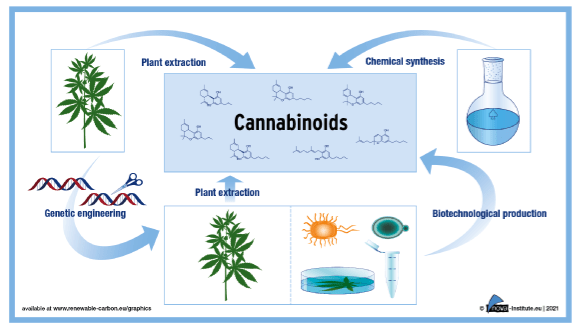Biotechnological production processes can unveil pharmacological profiles and potential effects of cannabinoids that are present in cannabis only in small amounts, according to a new report from Germany’s nova-Institute.
Aimed at experts in the pharmaceutical and biotech industries, the report is a guide to the complex synthesis of cannabinoids and state-of-the-art production methods, nova said in a press release.
The 142-page report, “Production of Cannabinoids via Extraction, Chemical Synthesis and Especially Biotechnology – Current Technologies, Potential & Drawbacks and Future Development,” suggests targeted biotechnological synthesis as a way to get at more of the currently known 120 different cannabinoids, mainly derived from Cannabis sativa – industrial hemp.
Different paths
Biotechnological production of cannabinoids can be achieved in many different ways: In eukaryotes, such as plants, algae, eukaryotic cell cultures and yeast, but also in prokaryotes, such as bacteria, or in enzymatic cell-free systems. Natural cannabinoid synthesis in Cannabis sativa is performed via a complex pathway system that combines enzymes, products and intermediates from three different pathways, the report points out.
Nova said 17 companies among 59 surveyed are producing cannabinoids through biotechnology. Fourteen of those reported they use yeast, algae or bacterial systems while three have established cell-free systems, nova said.
Combining options
The advantages and disadvantages of plant extraction, chemical synthesis and biotechnological cannabinoid production, and the potential synergies that might emerge among those three production options, are dealt with in the report. The report also includes an extensive description of pharmacological effects, therapeutic potential and medicinal applications for delta-9 THC and CBD, and provides an overview of the EU regulatory framework for cannabinoids.
Main authors of the nova-Institute report are biotechnology experts and physicians from the nova-Institute, Dr. Pia Skoczinski and Dr. med. Franjo Grotenhermen, and the chemist Dr. rer. nat. Bernhard Beitzke, a long-time adviser to the European Industrial Hemp Association.
The report is priced at €2,000.

